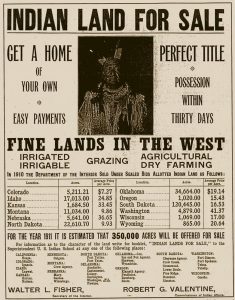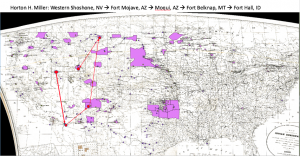This summer, I assisted Professor Dustin Frye with his research of the Dawes Act and how it affected Native American land ownership from the years 1887-1935. The Dawes Act, which was passed in 1887, divided up Indian reservations into 160-acre plots. These plots were given to families in an effort to integrate Native Americans into traditional American society, forcing them to leave their customary tribal units and become individual farmers. My focus within this project was to track the implementation of the Dawes Act across reservations over time. First, I utilized GIS software to digitize a map of Native American reservations in the year 1888. After digitizing the map, I could see how the reservations had been broken up and changed by comparing the 1888 map to similar maps in the years 1990 and 2010.
First, I utilized GIS software to digitize a map of Native American reservations in the year 1888. After digitizing the map, I could see how the reservations had been broken up and changed by comparing the 1888 map to similar maps in the years 1990 and 2010.
Next, I created a complete U.S. township map and compiled land patent data from the Bureau of Land Management. By looking at the land transactions related to the Dawes Act and connecting the information to each specific township, we can observe spatial patterns of how the Dawes Act affected each reservation.
Indian agents, who were members of the Bureau of Indian Affairs that managed reservations and the schools located on them, played a key role in the implementation of the Dawes Act. I have been collecting the names of the Indian agents in order to track their movement across different reservations over time. I have examined census documents and reservation reports written by these agents from the years 1867 to 1940 to search for their names. By connecting their movement to the land patent and township data, we can see their involvement in the implementation of the Dawes Act and ultimately their impact of the relocation of reservation residents over time.
This research opportunity has allowed me to analyze a historical event using techniques of Economics and Geography. I am now more confident in my research capabilities and can manipulate data within different perspectives. I hope to translate the skills I have learned through the Ford Program into my future endeavors.

